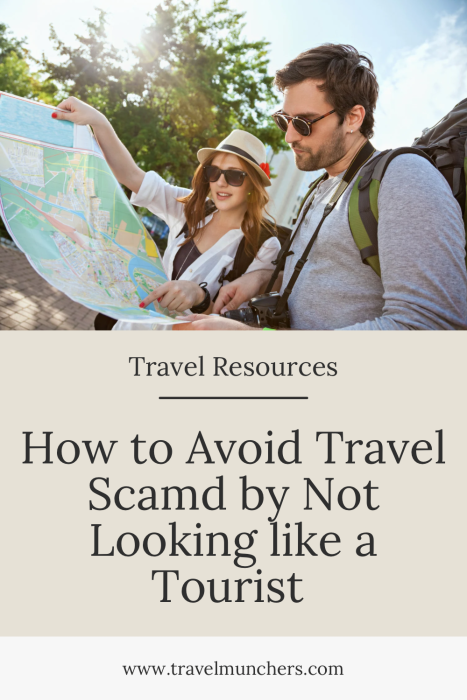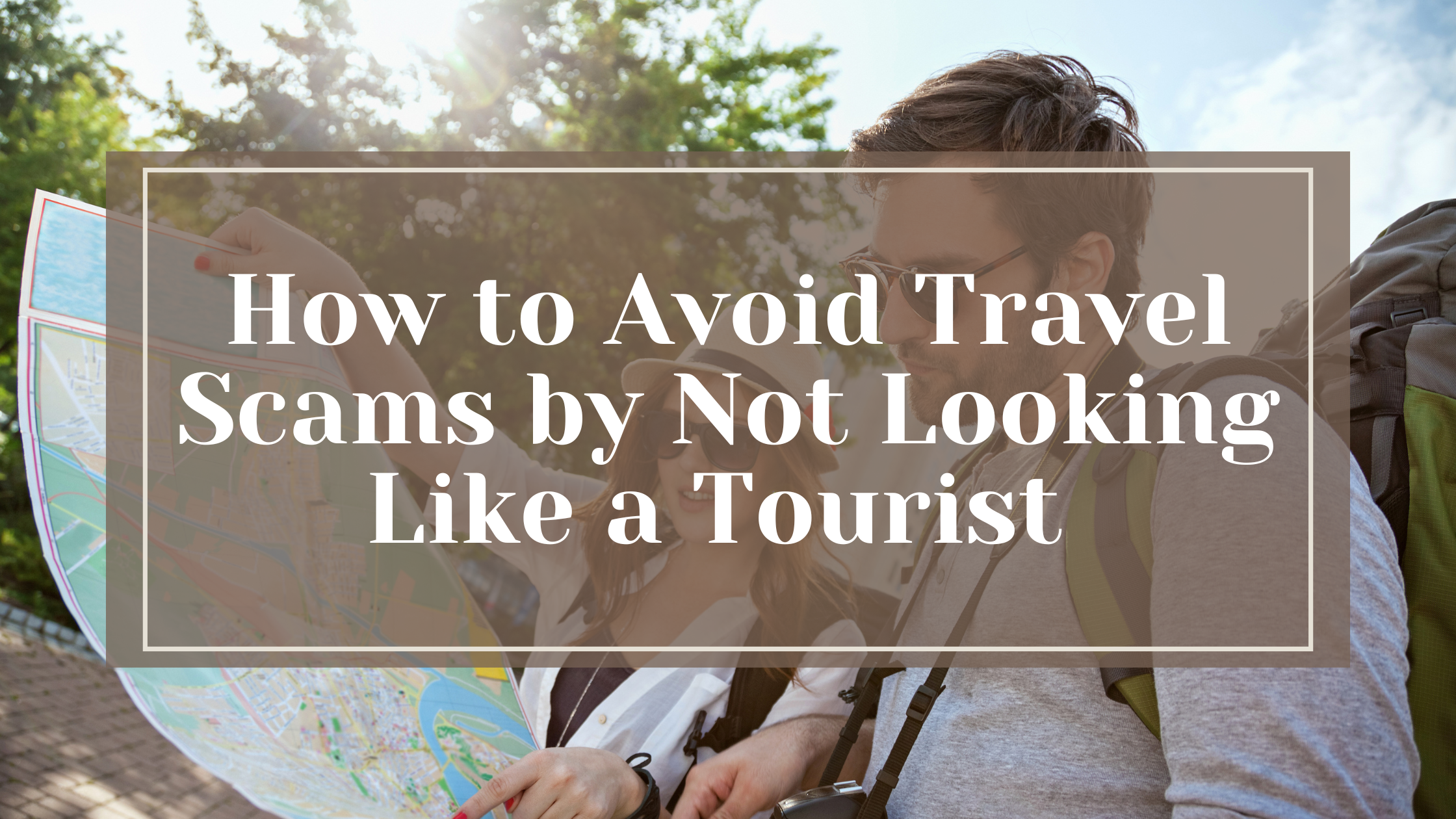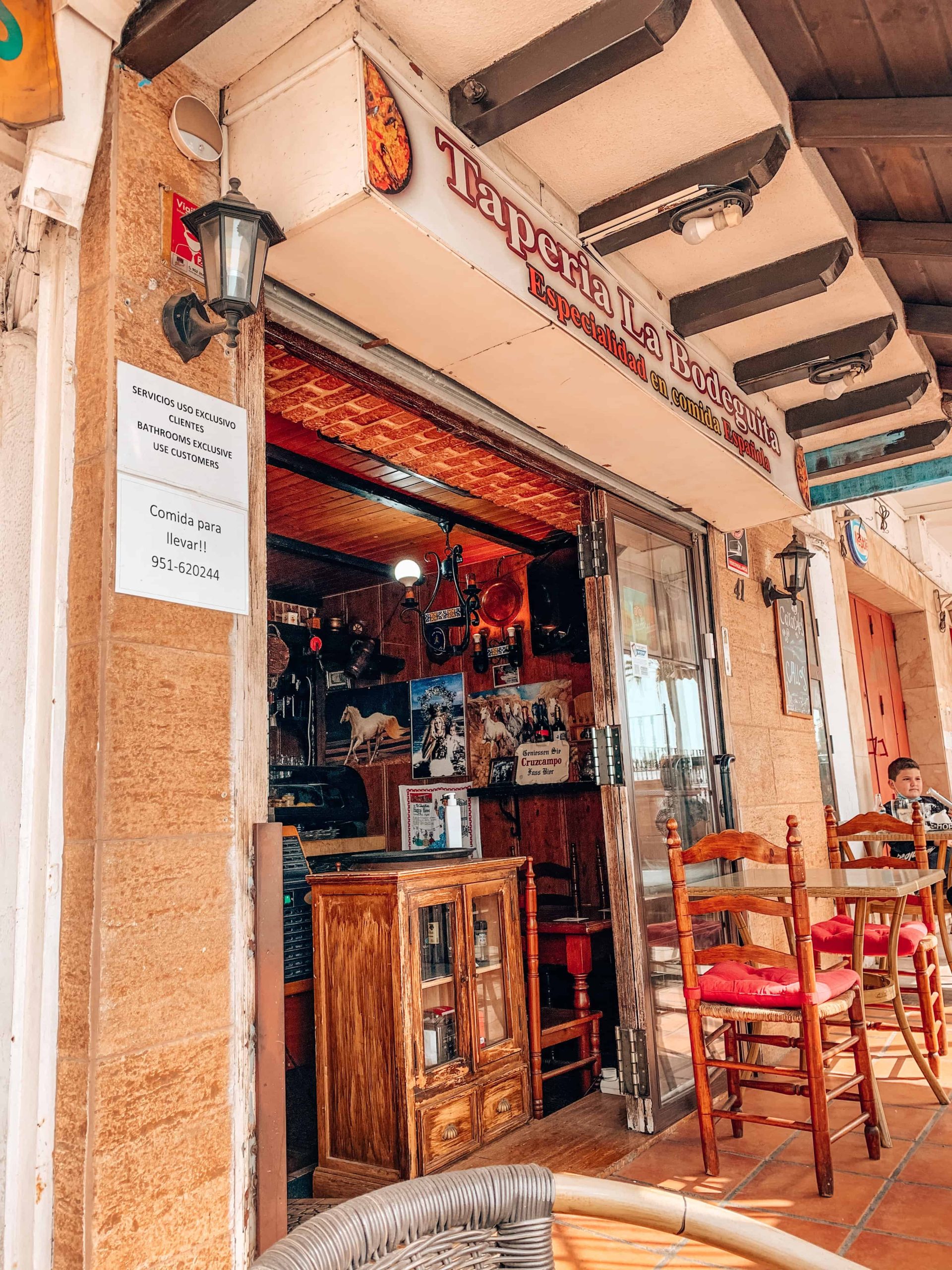How to Avoid Travel Scams by Not Looking Like a Tourist
How to Avoid Travel Scams by Not Looking Like a Tourist
Looking like a tourist can make you a prime target for scams because scammers often prey on people who appear unfamiliar with their surroundings or local customs. Tourists may stand out due to behaviors like carrying maps, taking photos, or displaying valuables like cameras and wallets. This visibility signals to scammers that you may be less aware of common local scams, more trusting, and potentially carrying more cash or valuable items. Tourists are also often in a hurry to enjoy their trip, making them more susceptible to distraction tactics or offers that seem helpful but are actually part of a scam. By blending in and staying aware, you can reduce the chances of being targeted.
Recent reports reveal an alarming rise in travel scams targeting tourists, especially during peak vacation seasons. According to a 2023 analysis, common scams include taxi fraud, fake accommodation listings, and deceptive “free gift” offers. Platforms like Airbnb have removed thousands of fake listings, while travelers also face risks from overcharging taxi drivers, pickpockets, and street vendors. Scammers prey on tourists’ unfamiliarity with local customs, often using friendly interactions to deceive and exploit them (Travel Daily Media) (Global News). Staying informed about these tactics is essential to avoid falling victim to these growing threats.
In a Rush? Pin it to Read Later!

Copyright Notice: All material on this travel blog site is the sole property of Travel Munchers. This includes blog posts, pages, design and all photos (whether watermarked or not). Any use of materials from this site without express written consent will be considered copyright infringement.
Disclaimer: Some items contain affiliate links and I will get a small commission at no additional cost to you. I really appreciate your support if you like my recommendations!
Understanding Why Tourists Are Targeted
Profile of a Typical Tourist:
Tourists are easy targets for scammers due to several factors that make them more vulnerable compared to locals. It’s important to understand who travel scammers target and why.
- Unfamiliarity with local customs is a significant issue—tourists often don’t know what behavior or prices are typical, making it easier for scammers to deceive them with inflated charges or misleading information.
- Reliance on maps, phones, and GPS can make tourists stand out, signaling that they are not familiar with the area, which can attract scammers who offer “help” only to mislead or overcharge them.
- Language barriers further compound this vulnerability, as tourists may struggle to communicate effectively or understand local warnings, leaving them more susceptible to fraudulent activities. Additionally, tourists are often in vacation mode, less vigilant, and more trusting, which scammers exploit by offering fake deals or pretending to be helpful
What Kind of People do Travel Scammers Target and Why?
Common Scams Targeting Tourists:
There are many travel scams around the world and it is important to learn how to avoid them. Let’s take a look at some of the most common scams.
Overcharging: This scam often occurs in taxis, restaurants, or shops, where tourists are charged much higher prices than locals. For instance, taxi drivers may inflate fares, take longer routes, or fail to use the meter, especially if they sense you are unfamiliar with the area.
Fake Guides: Scammers posing as official tour guides approach tourists offering personalized tours, often charging steep fees for subpar or misleading experiences. Some may even direct tourists to shops or attractions where they receive commissions.
Pickpocketing: Common in crowded tourist spots, pickpockets use various techniques to steal wallets, phones, or other valuables. Distraction plays a key role, with accomplices creating a commotion, asking for directions, or bumping into you, while another thief targets your belongings.
Distraction Techniques: Scammers may use various methods to divert your attention, such as dropping something in front of you or pretending to need help. While you’re distracted, an accomplice takes the opportunity to steal from you or scam you in another way.
Travel Scams around the world & How to Avoid them
How to Blend In and Avoid Looking Like a Tourist
Dress Like a Local:
Research Local Fashion Trends: Before your trip, look into local fashion through travel blogs, social media platforms like Instagram, or fashion websites tailored to the region. Pay attention to what locals are wearing in terms of colors, fabrics, and style. Aim for neutral or understated clothing that aligns with the local vibe, avoiding items that scream “tourist,” like graphic T-shirts with logos or excessive outdoor gear in urban settings.
Avoid Flashy Accessories: Wearing expensive-looking jewelry, watches, or branded accessories can attract unwanted attention from scammers or thieves. Opt for simple, functional pieces that don’t draw attention. Leave valuable items like flashy watches, large cameras, and designer bags in your hotel or at home.
Skip the Tourist Gear: Items like large backpacks, fanny packs, cameras slung around the neck, and guidebooks make you stand out as a tourist. Instead, use a discreet, crossbody bag or an anti-theft bag, and rely on your phone for navigation rather than carrying maps. If you need a map, check it discreetly to avoid looking lost.
Mimic Local Norms: Observe how locals behave and dress, including the types of shoes they wear, how they layer their clothing, and whether they dress more formally or casually. Avoid overly casual attire like flip-flops and shorts in settings where locals are more dressed up.
Learn Basic Local Phrases:
Speaking the local language to a basic level can significantly reduce unwanted attention and help you navigate travel scams more effectively. When tourists can communicate in the local language, even just basic phrases like greetings or asking for directions, they appear more confident and less vulnerable, making scammers less likely to target them. Being able to say “no thank you” or ask for help in the local language also deters overly aggressive vendors or street scammers who rely on exploiting language barriers. Additionally, understanding key phrases can help you better assess the authenticity of offers and engage more comfortably with locals, making your travel experience smoother and safer.
Carry Yourself with Confidence:
Your posture, body language, and behavior can significantly affect how you’re perceived by potential scammers. When you stand tall with confident posture, make purposeful eye contact, and move with intention, you signal that you are aware of your surroundings and not easily fooled. Conversely, slouching, appearing distracted, or nervously checking your phone can make you look like an easy target. Walking confidently, with a clear sense of direction, and avoiding behaviors that indicate confusion or anxiety can deter scammers who look for vulnerable, inattentive individuals. Showing self-assurance through your body language can help you avoid unwanted attention and stay safer while traveling.
Use Discreet Navigation Tools:
Using maps and GPS without drawing attention while traveling requires strategic planning. One effective approach is to pre-download maps on your phone through apps like Google Maps, allowing you to access navigation offline without constantly checking your device in public. This reduces the need to stop and visibly consult a map or phone, helping you blend in more effectively.
Additionally, using wearable tech, such as smartwatches, can discreetly provide turn-by-turn directions, so you can navigate without pulling out your phone or a paper map, which can attract attention. You can also memorize key routes and landmarks before heading out, which minimizes the need for checking your map frequently. When you do need to check your map or GPS, try to do so discreetly—step into a café, a shop, or a quieter area rather than stopping in the middle of a busy street where you might draw attention.
Avoid Tourist Traps:
To steer clear of heavily trafficked tourist areas and experience more authentic local culture, it’s important to do some research beforehand. Start by exploring neighborhoods outside of major tourist attractions—seek out recommendations from travel blogs, social media groups, or locals you meet during your trip. Websites like Yelp, Google Reviews, or TripAdvisor can help you identify where locals dine and shop, but be wary of overly popular spots as they may still cater to tourists.
Walk or use public transport to discover hidden gems, such as neighborhood markets, cafés, and restaurants that aren’t advertised in guidebooks. Locals often frequent smaller establishments that serve regional cuisine and offer better value than tourist traps. By avoiding peak tourist zones and looking for lesser-known areas, you’ll enjoy a more authentic experience while reducing the chances of falling victim to scams.
Practical Tips for Staying Safe as a Tourist
Keeping Valuables Secure:
Using money belts, underclothes storage, and avoiding flashing expensive items are essential strategies for keeping your valuables safe while traveling. Money belts and underclothes storage options, such as hidden pouches or neck wallets, provide discreet places to store cash, passports, and credit cards, reducing the risk of theft. These items should be worn under your clothes, making them difficult for pickpockets to access.
Avoid flashing expensive items like luxury watches, jewelry, or high-end electronics, as this can attract the attention of thieves. Instead, keep valuable items secured in your hotel safe when not in use, and only carry what you need for the day. Keeping a low profile and using concealed storage options can help you stay safer and avoid becoming a target for theft.
Be Aware of Your Surroundings:
Educate Yourself: Understanding common scam tactics can make you more aware. Familiarize yourself with common types of scams like phishing, advance-fee frauds, and fake job offers.
Verify Sources: Always check the legitimacy of the source. If you receive an unexpected email or message, verify the sender’s address, especially if they’re asking for personal information or money. For websites, look for secure connections (https://) and check for reviews or credible information.
Use Strong Passwords and Two-Factor Authentication: Protect your online accounts with strong, unique passwords and enable two-factor authentication (2FA) whenever possible. This adds an extra layer of security.
Be Cautious with Links and Attachments: Avoid clicking on links or downloading attachments from unsolicited emails or messages. Hover over links to preview URLs and ensure they lead to legitimate sites.
Research Offers and Requests: Be skeptical of offers that seem too good to be true. Research companies or individuals making unsolicited offers or requests for money.
Look for Red Flags: Watch for warning signs such as urgent language, requests for secrecy, grammatical errors, and unsolicited contact from unknown sources.
Verify Contact Information: If you receive a suspicious communication from a company or institution, contact them using verified information from their official website or customer service line to confirm the legitimacy of the communication.
Monitor Your Accounts: Regularly check your bank statements, credit reports, and online accounts for unauthorized transactions or changes.
Use Security Software: Keep your computer, smartphone, and other devices protected with up-to-date antivirus and anti-malware software.
Report Suspicious Activity: If you encounter a potential scam, report it to relevant authorities or organizations. This helps prevent others from falling victim to the same scam.
Trust Your Instincts:
Early Warning System: Intuition often alerts you to potential problems before you have all the facts. It’s your brain’s way of processing subtle cues or inconsistencies that may not be immediately obvious.
Experience-Based: Intuition is often built from past experiences and knowledge. If you’ve encountered similar situations before, your brain may recognize patterns or red flags even if you’re not consciously aware of them.
Complement to Analysis: While analytical thinking and research are crucial, intuition can complement these by guiding you to areas that need more scrutiny or questioning.
How to React When Something Feels Off
Learn from the Experience: Reflect on the situation to understand what triggered your intuition and how you can apply this awareness in future scenarios.
Pause and Assess: If your intuition signals that something is wrong, take a moment to pause. Avoid making any immediate decisions or actions. This allows you time to critically assess the situation.
Gather More Information: Look for more details and verify the legitimacy of the source. Check facts, research the context, and seek out additional perspectives if necessary.
Consult with Others: Discuss your concerns with someone you trust. They might provide a different perspective or help you spot potential issues you might have missed.
Verify Authenticity: If you receive a suspicious communication, contact the organization or individual using verified contact information. Don’t use any contact details provided in the suspicious message or offer.
Trust Your Gut but Stay Objective: While intuition is valuable, it’s important to balance it with objective analysis. Make sure your concerns are based on solid reasons rather than just a feeling.
Take Precautionary Measures: If you’re unsure about the legitimacy of a situation or offer, take protective measures. For example, if you suspect a phishing attempt, don’t click on any links or provide any personal information.
Report Concerns: If you determine that something is indeed a scam or fraudulent, report it to the relevant authorities or platforms. This helps protect yourself and others from potential harm.
Plan Your Day Like a Local:
To seamlessly navigate a city like a local, it’s essential to research its customs, peak times, and cultural norms. Understanding local customs helps you interact respectfully and blend in with everyday practices, while knowing peak times, such as rush hours or popular dining hours, allows you to plan your activities more efficiently and avoid crowded places. Familiarizing yourself with cultural norms, from social etiquette to dress codes, ensures you align with the local way of life, fostering positive interactions and minimizing misunderstandings. This comprehensive approach not only enhances your experience but also helps you move through the city with confidence and ease, much like a true resident.
Top 7 Travel Safety Tips
What to Do if You Are Targeted
Reacting to Scams:
Cease Communication: Immediately stop all interaction with the scammer. Do not respond to further messages or continue phone calls.
Secure Your Accounts: If you’ve shared any personal or financial information, change your passwords and notify your bank or financial institutions. Monitor your accounts for any unauthorized transactions.
Collect Evidence: Gather all relevant information and documentation related to the scam. This includes emails, messages, screenshots, and details of the interaction. This evidence will be useful for reporting the scam.
Notify Your Contacts: Inform friends, family, or anyone who might be affected by the scam. This can help prevent others from falling victim to the same scam.
Review and Monitor: Keep a close eye on your financial statements and credit reports. Consider placing a fraud alert or credit freeze with major credit bureaus to prevent identity theft.
Educate Yourself: Reflect on the scam to understand how it occurred and learn how to recognize similar scams in the future. This can help you avoid falling victim again and protect others.
Seek Professional Help: If necessary, consult with a legal or financial advisor for further guidance, especially if significant financial loss or identity theft is involved
Local Support Systems:
Report to Authorities:
- Local Authorities: File a report with your local police department. Provide them with all collected evidence.
- National Agencies: Report the scam to national organizations like the Federal Trade Commission (FTC) in the U.S., Action Fraud in the UK, or similar agencies in your country.
- Consumer Protection Websites: Use online platforms like the Better Business Bureau (BBB) Scam Tracker or other consumer protection sites to report the scam.
Embassies and Consulates
- Contact Information: Before traveling, note the contact details of your country’s embassy or consulate in your destination. This information is often available on the embassy’s official website or through your country’s foreign affairs department.
- Emergency Assistance: If you face a serious issue such as a scam involving identity theft or fraud, visit or contact the embassy or consulate. They can provide guidance, help you with legal matters, or assist in contacting local authorities.
- Documentation and Verification: When reaching out, be prepared to provide identification and any relevant documentation. The embassy can assist in replacing lost passports, verifying identity, or communicating with local authorities on your behalf.
Local Law Enforcement
- Find Local Police Stations: Use online maps or local directories to locate the nearest police station. For immediate emergencies, you can often call a local emergency number (e.g., 112 in many European countries, 911 in the US).
- Report the Incident: If you’ve been scammed or are in another form of distress, file a report with the local police. Provide them with all evidence and details related to the scam or incident.
- Follow Up: Obtain a copy of the police report or case number for follow-up. This documentation can be crucial for insurance claims or further legal actions.
Travel Apps
- Travel Safety Apps: Many travel apps offer safety features, including emergency contact information and local law enforcement details. Examples include TripIt, which provides safety alerts, and apps like SmartTraveler or TravelSafe.
- Emergency Features: Some apps have built-in emergency functions that allow you to quickly contact local authorities, share your location with trusted contacts, or receive real-time alerts about safety issues in your area.
- Contact Support: Use the app’s support features to get advice or assistance. Many travel apps have customer support teams that can offer guidance or connect you with local resources.
Additional Tips
- Document Everything: Keep records of all communications and actions taken, whether dealing with the embassy, local law enforcement, or through travel apps. This will help in any follow-up actions or claims.
- Stay Calm and Composed: Approach each resource methodically and provide clear, concise information about your situation.
- Be Aware of Scams: When seeking help, be cautious of potential scammers posing as helpful services. Verify the authenticity of contacts and services.
Holiday Travel Scams: Essential Hacks to Safely Protect Yourself
Need More Travel Tips?
💳 WANT TO TRAVEL FOR FREE?
Want to travel for free, simply as a reward for spending money you already had to spend ? I love my Capital One travel card and I think you will too! You get unlimited miles on every purchase with a card that fits your lifestyle. Plus 10x points on hotels and 5x points on flights booked through their travel portal!!! If you ever wanted to travel in luxury, this is the card for you. Check out our referral link!
🧳 NEED TRAVEL INSURANCE?
Peace of mind comes when you book travel insurance. You do not need to worry about flight cancelations, lost luggage, or any illnesses while traveling. Check out the first ever specific Digital Nomad insurance we use here : SafetyWing. ETKA, Vistors Coverage , or Insubuy.
NEED AN eSIM?
Check out our article on the top eSIM Providers for Digital nomads and world travelers:
Top eSIM Providers for Digital Nomads: Streamlining Connectivity While Traveling
NEED a Rental Car?
Check out the best options for renting a car for your trip to give you more freedom and flexibility while you travel ! Check out Rent A Car here.
Want Lounge Access when Flying?
If you want access to over 1,500 lounges in 600 locations then you need to check out Priority Pass!
Happy travels xx
Like it? Pin it!

Follow our adventures on social!







2 Comments